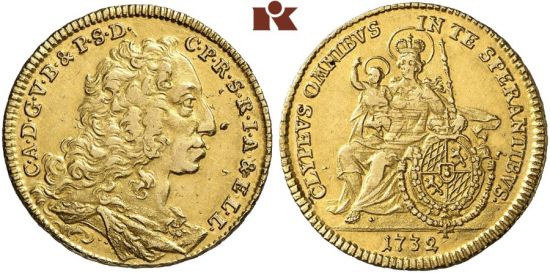Difference between revisions of "Bavaria 1732 carolin Fr-232"
(added link) |
(revised link) |
||
| Line 15: | Line 15: | ||
''Link to:'' | ''Link to:'' | ||
| − | |||
* [[Bavaria 1730 1/2 carolin Fr-230|1730 half carolin]] | * [[Bavaria 1730 1/2 carolin Fr-230|1730 half carolin]] | ||
* [[Bavaria 1730 carolin Fr-229|1730 carolin]] | * [[Bavaria 1730 carolin Fr-229|1730 carolin]] | ||
* [[Bavaria 1731 1/2 carolin Fr-230|1731 half carolin]] | * [[Bavaria 1731 1/2 carolin Fr-230|1731 half carolin]] | ||
| + | * [[Bavaria 1731 carolin Fr-229|1731 carolin]] | ||
* [[Bavaria 1732 30 kreuzer KM-418.1|1732 30 kreuzer, mature bust]] | * [[Bavaria 1732 30 kreuzer KM-418.1|1732 30 kreuzer, mature bust]] | ||
* [[Bavaria 1732 1/2 carolin Fr-233|1732 half carolin]] | * [[Bavaria 1732 1/2 carolin Fr-233|1732 half carolin]] | ||
Revision as of 09:23, 14 November 2024
This specimen was lot 3577 in Künker sale 264 (Osnabrück, June 2015), where it sold for €2,400 (about US$3,100 including buyer's fees). The catalog description[1] noted,
"SEIT 1623 KURFÜRSTENTUM, Karl Albert, 1726-1745. Karolin 1732, München. GOLD. Selten in dieser Erhaltung. Vorzüglich. (Electorate of Bavaria, Charles Albert, 1726-45, carolin d'or of 1732, Munich mint. Rare in this grade, extremely fine.)"
The eighteenth century saw a fad for absolutist rulers issuing gold coins named after themselves. The most important was the French louis d'or introduced by Louis XIII and issued until the French Revolution in 1789. In Prussia, Frederick the Great minted the friedrichs d'or and Denmark alternated between frederiks d'or and christians d'or depending on who held the throne. In Bavaria, the carolin d'or superseded the maximilian d'or in 1726 but was minted only until 1737 along with half and double carolin d'or. An imperial decree of 1736 banned their production by reason of the low fineness of gold. The type shown here was issued 1732-35.
Recorded mintage: unknown but scarce.
Specification: 9.7 g, .770 fine gold, 9.84 g.
Catalog reference: Fr-232; Hahn 259, KM 424.
- Friedberg, Arthur L. and Ira S. Friedberg, Gold Coins of the World, From Ancient Times to the Present, 9th ed., Clifton, NJ: Coin and Currency Institute, 2017.
- Michael, Thomas, Standard Catalog of World Coins, 1701-1800, 7th ed., Iola, WI: Krause Publications, 2016.
- [1]Künker Münzauktionen und Goldhandel, Catalog 264, Gold coins | Russian Coins and Medals | German Coins after 1871, Osnabrück: Fritz Rudolf Künker GmbH & Co., AG, 2015
Link to:
- 1730 half carolin
- 1730 carolin
- 1731 half carolin
- 1731 carolin
- 1732 30 kreuzer, mature bust
- 1732 half carolin
- 1732 carolin, bare bust
- Hesse-Darmstadt 1733-G K carolin Fr-1208
- Pfalz 1733 carolin Fr-2029
- Fulda 1735 carolin Fr-1055
- Wurttemberg 1735-S FB carolin Fr-3589
- Wurzburg 1736 carolin Fr-3707
- Coins and currency dated 1732
- return to coins of German States, Bavaria
